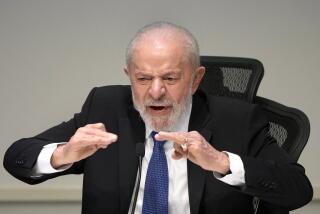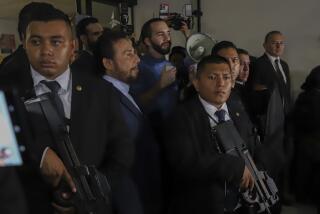Marcos May Hold Snap Election : Prepared to Seek New Mandate in 3 Months, He Says
- Share via
WASHINGTON — Philippine President Ferdinand E. Marcos, beset by criticism at home and abroad, said Sunday he is “ready to call a snap election” in “perhaps three months or less” to let the Philippine people pass on his “alleged ineptness.”
Marcos, however, did not flatly predict an early election. He pointed out that a change in his country’s election schedule will require that the Philippine legislature amend a legal provision under which the president’s present seven-year term will expire in 1987.
Asked if, on the basis of his comments, Americans could expect balloting in January or February, Marcos replied, “Yes, if I can convince the Batasang (National Assembly), and I think I can; we control two-thirds of the membership.”
Sensitive to Demands
Marcos, who has spent 20 of his 68 years as his country’s ruler, made it clear during an interview on the ABC-TV interview program “This Week With David Brinkley” that he is sensitive to demands for reforms emanating not only from his own people but also from Washington.
Those demands were discussed on the same program Sunday by Sen. Paul Laxalt (R-Nev.). Two weeks ago, Laxalt delivered to Marcos a handwritten note from President Reagan expressing concern over the Philippine government’s failure to deal with problems that afflict the country’s economy, its armed services and its internal security. Laxalt is one of Reagan’s closest friends.
Marcos’ surprise announcement drew a qualified endorsement from one of his leading congressional critics, Rep. Stephen J. Solarz (D-N.Y.), chairman of the House Foreign Affairs subcommittee on Asia. Solarz said in a statement that the election’s ultimate significance “depends on whether it would be genuinely free and fair.”
Fair Election ‘Essential’
“The restoration of democracy is essential if the Communist challenge is to be turned back,” Solarz said. “A genuinely free and fair election would be essential, but a fraudulent election would be worse than none at all.”
During Sunday’s interview, in which Marcos talked via satellite from Manila with reporters stationed in Washington, the Philippine president belittled charges of fraud in past elections and indicated that he will permit outside observers to view the balloting.
“You are all invited to come, and we will invite members of the American Congress to please come and see what is happening here,” he said. “All this talk about fraud--it’s sour grapes, poor losers . . . a publicity stunt.”
Concedes Problems
Marcos conceded that his country faces serious problems. He said his administration is trying to work out a recovery program to deal with an “economic crisis” that he said is “umbilically linked” with the nation’s “insurgency problem.”
The “snap election” concept surfaced when a questioner suggested that Marcos’ difficulties stem from erosion of his electoral mandate and asked if he might call an election ahead of schedule.
Without further prompting, Marcos said that his Philippine opposition has been asking for an election and that he is ready to call for one in three months or less “if all these childish claims to popularity on both sides have to be settled.”
“I think we better settle it by calling an election right now, or, say, give everybody 60 days to campaign and to bring the issues to the people,” Marcos said.
Appearing alert and in reasonable health despite recent reports that he has undergone medical treatment, Marcos declared that he is ready for a race and is prepared to face anyone.
Marcos vehemently denied a suggestion that he is seeking a new mandate in response to foreign pressure. But he said that charges of “ineptness” have been raised by critics, including some of Sunday’s questioners, with a potential impact on the Philippine armed forces and other institutions, and that “this should be brought to our people.”
Pressed for details on how to bring the election about, Marcos indicated that he intends to propose a kind of national vote of confidence in his long-lived administration.
“It probably would be sufficient,” he said, “for the legislature, upon my suggestion . . . to include in the pending election code a statement to the effect that, in addition to the other causes for holding a special election--which are the proved disability of the president, his death, his removal from office and resignation . . . you can add another instance: where, in his judgment, there is need to bring a fundamental issue to the people.”
Headlines in Manila
Portions of the Marcos interview were shown on television in Manila at midnight Sunday and this morning’s Manila newspapers reported the president’s statement under banner headlines.
In Manila this morning, Deputy Prime Minister Jose Rono denied that the president’s comments were “off the cuff.”
“I think this is more real,” he told members of Marcos’ ruling KBL Party and opposition parties at a breakfast forum. He added that the ruling party will call a caucus this week to put the president’s plan into action.
By midday today there was still no official announcement from Malacanang Palace, the presidential residence, but politicians and analysts assumed the elections were set.
Neal Cruz, a Manila newsman who moderated the breakfast meeting, said, “The guessing game is over.”
Enrique Romualdez, publisher of the newspaper Daily Express, said a presidential spokesman told him that the election will be held Jan. 17. It was not immediately clear whether vice presidential candidates would also run.
The next scheduled presidential election is May 1987, the end of Marcos’ current six-year term. The 68-year-old president has raised and rejected the prospect of snap presidential elections several times in the past year.
U.S. Pressure Cited
Several participants in the breakfast forum suggested that American pressure, including Laxalt’s recent visit, has forced Marcos to make the decision.
A U.S. Embassy spokesman, saying there has been no official word on the elections, repeated the longstanding embassy response to charges of pressure: “We are for free and open elections. We have not taken a position on when they should be held. That is up to the Philippines.”
Former senator Salvador Laurel, the Unido Party leader, and the only declared opposition candidate for president, said this morning in a statement in Los Angeles: “We are ready to fight Marcos or any KBL candidates in any election, snap or regular. We have been alerting the people to this possibility ever since Malacanang has been hemming and hawing on the matter.
“We hope this time Mr. Marcos means it. Mr. Marcos and the KBL can do their worst.”
There was no immediate response today from another likely Marcos opponent: Corazon Aquino, the wife of former Sen. Benigno S. Aquino Jr., whose assassination at Manila airport in August, 1983, set off a wave of political protest here.
Eva Estrada Kalaw, a Liberal Party leader, said the opposition is ready to contest a January election. “We have to give the people an enlightened choice” for a candidate, she said. “The people want a change.”
Opposition spokesmen questioned whether Marcos could constitutionally call early elections and said an early vote should at least be held at the same time as the scheduled elections for local officers next May.
Election Called Costly
Arturo Tolentino, a member of the president’s party and former foreign minister, told the breakfast meeting that he thinks that Marcos “can be persuaded” to change his mind. He and others said the cost of a special election would be disastrous to the reeling Philippine economy.
During the Washington interview, Marcos had a compromise answer ready when he was asked to comment on Laxalt’s disclosure that he had warned the Philippine president that reinstatement “for any extended period” of Gen. Fabian C. Ver as the Philippines’ military chief of staff “could well cause a firestorm here in the Congress.”
Charges lodged during the probe into the Aquino murder have linked Ver to the killing. There has been no decision in the protracted, highly controversial case.
“I have given my word of honor that if he is acquitted, he will be reinstated, but I never promised how long he was going to stay,” Marcos said in words that seemed to suggest that Ver’s return, if it comes, may be short.
Times staff writer Nick B. Williams Jr., in Manila, contributed to this story.
More to Read
Sign up for Essential California
The most important California stories and recommendations in your inbox every morning.
You may occasionally receive promotional content from the Los Angeles Times.













